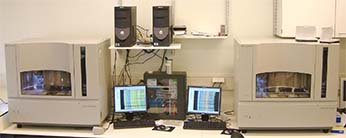 This workpackage aims to establish a European virtual centre for targeted knock-out of genes of interest by resequencing of mutagenized fish (also known as TILLING). This technology, developed by Hubrecht Laboratory, allows to study the function of ‘difficult’ genes for which no mutations have been possible to recover by forward genetic screens, or which relate to processes that are difficult to study by forward genetic approaches, such as duplicated genes or functionally redundant genes. Our project is the first one to perform this type of work in a high-throughput manner.
This workpackage aims to establish a European virtual centre for targeted knock-out of genes of interest by resequencing of mutagenized fish (also known as TILLING). This technology, developed by Hubrecht Laboratory, allows to study the function of ‘difficult’ genes for which no mutations have been possible to recover by forward genetic screens, or which relate to processes that are difficult to study by forward genetic approaches, such as duplicated genes or functionally redundant genes. Our project is the first one to perform this type of work in a high-throughput manner.
The planned workload of 180 knock-outs is distributed between the laboratories of Sanger (D. Stemple), Hubrecht Laboratory (R. Plasterk and E. Cuppen) and TUD (M. Brand, previously at MPI CBG). This resource is open to all members of the consortium as well as external researchers. Up to 60 knock-outs will be performed for researchers outside the consortium, whose requests are considered on the basis of their scientific merit.

